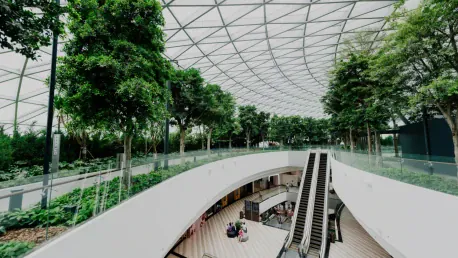As the world becomes increasingly aware of environmental issues, the construction industry is experiencing a significant shift toward sustainable and energy-efficient practices, leading to the rapid growth of the Green Building Market.
The Rising Demand for Eco-Friendly Structures
With environmental concerns at the forefront of global priorities, there is a heightened demand for buildings that not only reduce the environmental impact but also improve energy efficiency and occupant health. This growing awareness has led architects, construction firms, and technology providers to collaborate on creating structures that meet eco-friendly standards.
Integration of Advanced Technologies
The incorporation of advanced technologies, such as IoT-driven systems and artificial intelligence (AI), is reshaping the design, construction, and operation of buildings. These smart technologies enable real-time monitoring of building performance and energy consumption, enhancing the overall efficiency and sustainability of structures. Renewable energy systems, like solar and wind power, are being integrated into building designs to further reduce the carbon footprint.
Importance of Strategic Collaborations
To drive market growth, strategic partnerships between key players in the industry are essential. Companies such as Kingspan Group, Turner Construction Company, and Jacobs Engineering Group Inc. are leading the charge by integrating sustainable practices and innovative solutions into their projects. These collaborations ensure that buildings are not only energy-efficient but also conducive to occupant health and well-being.
Emerging Trends in the Market
Several emerging trends are shaping the Green Building Market. One such trend is the use of predictive maintenance and energy management systems powered by AI. These systems anticipate potential issues and optimize building performance, resulting in reduced operational costs and prolonged building lifespans. Another trend is the customization of products and construction methods to meet specific sustainability needs.
Market Segmentation and Applications
The market can be segmented into various categories, including energy-efficient buildings, sustainable architecture, eco-friendly materials, green roofing, and renewable energy integration. Applications of these segments span multiple sectors, including residential, commercial, industrial, educational, and healthcare facilities. Each application benefits from the tailored use of sustainable technologies such as solar power, rainwater harvesting, and energy-efficient HVAC systems.
Key Players Driving Growth
Prominent companies like Trane Technologies plc, Cemex SAB de CV, Skanska AB, JLL, Saint-Gobain, Honeywell International Inc., and SolarCity (Tesla) are instrumental in propelling the market forward. Their commitment to sustainability, along with their innovative products and strategic partnerships, plays a critical role in the expansion of the Green Building Market.
Opportunities and Challenges
While there are abundant opportunities for growth, particularly in regions where sustainable practices are still emerging, the market faces certain challenges. Regulatory constraints, operational inefficiencies, and a shortage of skilled professionals in sustainable construction are among the primary hurdles. To address these challenges, companies must advocate for supportive policies, engage in knowledge-sharing initiatives, and highlight the long-term benefits of green buildings.
Technological Advancements Shaping the Future
Advancements in technologies are pivotal to the market’s evolution. AI enables predictive maintenance and system optimization, while IoT-driven systems facilitate real-time performance monitoring. These innovations streamline construction processes, boost energy efficiency, and lower carbon emissions, reinforcing the sector’s commitment to sustainability.
Conclusion
As global awareness of environmental concerns rises, the construction industry is undergoing a major transformation toward sustainable and energy-efficient methods. This shift represents a collective effort to mitigate the impact of buildings on the environment, as traditional construction methods contribute significantly to carbon emissions and resource depletion. The Green Building Market is flourishing as it prioritizes the use of eco-friendly materials, renewable energy sources, and innovative design methodologies that reduce energy consumption and waste. Green buildings not only benefit the planet but also offer economic advantages, such as lower operating costs and higher property values. Additionally, these buildings contribute to healthier indoor environments by improving air quality and incorporating natural light, which in turn enhances the well-being of occupants. Governments, corporations, and consumers are increasingly supporting green construction, driven by regulations, incentives, and a growing preference for sustainable living. As this trend continues, the Green Building Market is expected to expand even further, playing a crucial role in the global effort to combat climate change and promote environmental stewardship.









